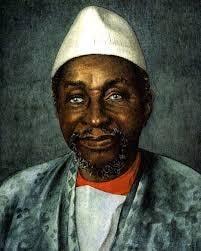
Amadou Hampâté Bâ, the Bandiagara library
Amadou Hampâté Bâ, born in 1900 in Bandiagara in Mali and died in 1991 in Abidjan in Ivory Coast,
is a Malian writer, philosopher, anthropologist, ethnologist, poet, historian and novelist,
reckless defender of the oral tradition.
Child of Hampâté Bâ and Pâté Poullo Diallo, he is a descendant of a noble Fulani family, and until
his death, will never cease to honor this Fulani origin.
It was at the Koranic school of Tierno Bokar that he began his academic career, before being
automatically requisitioned for the French school in Bandiagara then in Djenné.
The conditions in which he lived being difficult, he ended up escaping in 1915 to join his
mother in Kati where he continued his studies.
In 1916, he failed to be enlisted by the French army in Mopti to go to the front in Europe, in
because of his inability to prove his date of birth. The French army later judged that it
was far too young to be conscripted to fight, much to his delight.
Following this incident, Hampâté Bâ continued his studies, discovering a love for
African oral tradition.
In 1921, he refused to enter the National School of Gorée. Dissatisfied, the governor assigns him to
Ouagadougou as a punishment, as a temporary writer on an essentially precarious basis and
revocable. Thus, from 1922 to 1932, he held various positions within the colonial administration in
Upper Volta (Burkina Faso) then until 1942 in Bamako.
After years of investigations during which Amadou Hampâté Bâ served successively,
first at the French Institute of Black Africa (IFAN) in Dakar, then in 1962 where he was elected Member of the
Executive Council of UNESCO, he participated in 1966 in the development of a unified system for the
transcription of African languages.
Passionate about African cultural heritage, Amadou Hampâté Bâ collects it, transcribes it and
translated from an early age to save it, and collects valuable archives in various
languages in particular in French, Pular, adjami, bambara, and in Arabic which feed his work. He
attaches great importance to the values of solidarity and responsibility present in the
traditional African civilizations, and the relationship to the natural world and to spirituality.
He affirms: “We are condemned to understand nothing about traditional Africa if we consider it from
from a layman’s point of view”.
In his research at IFAN (Fundamental Institute of Black Africa), “the Fulani empire of Macina”,
Hampâté Bâ explains how the oral tradition, analyzed with method, can be considered
as a reliable archive. For him: “It is our duty, to us who have inherited a tradition
oral, than to try to transmit what we can before time and oblivion do it.
erase from the memory of men”
During the eleventh general conference of UNESCO, Amadou Hampâté Bâ gives a speech on
where he asks “that the safeguarding of oral traditions be considered as an operation of
urgent necessity as well as the safeguarding of the monuments of Nubia”
In 1962, at the Executive Council of UNESCO where he was recently elected, he answers to the American senator
Benton calling Africans ungrateful, illiterate and ignorant: “I concede that we are
illiterates, but I do not concede that we are ignorant. […] Learn that
in my country, every time an old man dies, a library has burned down”. Her
statement, true flower of orality has taken the rank of African proverb and Hampâté Bâ embodies
the old library.
Thanks to this discourse which has spread within African society and over the years as
wildfire, the African oral tradition has been granted a place of choice in the
preservation of archives.
If it has not always been the subject of dynamism and in-depth study in the same way as the
written tradition, thanks to passionate researchers like Amadou Hampâté Bâ, orality is
today part of the African cultural heritage.
The personified libraries constituted by the elderly are the object of listening, and participate in the
perpetuation of the African tradition.
During his inspiring career, Amadou Hampâté Bâ has received numerous distinctions
including a Silver Medal for the French Language Price which was awarded to him in 1975 by
the French Academy in recognition of services rendered to the French language, the Tropics Prize in
1991 and the Black African Literary Prize the same year for The Strange Fate of Wangrin.
An Amadou Hampâté Bâ foundation, supported by the Ivorian authorities, has been created in Abidjan,
with the vocation, in particular, of preserving the rich heritage constituted by the manuscripts,
including unpublished, research and archives of Amadou Hampâté Bâ.
In Dakar, a University bears his name.


Post a comment